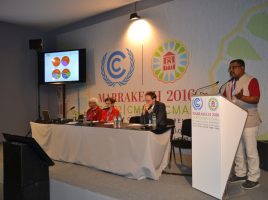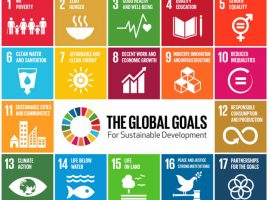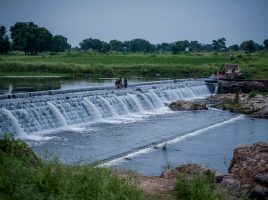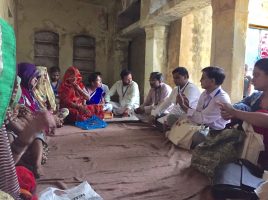Managing our Resources in a Sustainable Way
Natural resource management is the way we deal with managing the resources that we have while taking care of the people and the planet. The resources we have are finite and cannot be generated overnight. Every year we extract 55 billion tons of bio-mass, fossil energy, metal and minerals from the earth. At this rate, we need around 1.66 number of earths to provide the resources and absorb the waste that is generated.

TARAgram Orchha Office building, Uttar Pradesh and the SDC building at Swiss Embassy, Delhi made from low carbon cement based building materials
Purists and the environmentalists alongwith champions of sustainable development argue for sustainable consumption and production. On the other hand, with ever increasing population and their need for a better quality of life, industry and governments look for ways and means to produce goods and services in large quantities. The need of the hour is thus three-fold:
- An eco-logical approach to development
- Zero waste industrialisation
- Large scale productive and profitable reuse of waste generated
ZERI or the Zero Emission Research and Initiatives has been working for decades on seeking sustainable solutions for society inspired by nature’s design principles. Various initiatives on improving quality of life through sustainable use of diapers, designing and building bamboo structures for sustainable habitat, reforesting the Savannah into a spectacular rainforest and integrated farming are perfect examples of developing harmony with nature without compromising on the quality of life.
Increasingly large companies are turning themselves into zero landfill companies by recycling and reusing the waste generated. Pioneers amongst them are consumer goods giant Proctor and Gamble, beverage and chocolate maker Nestle, makers of solar panels SunPower, consumer goods producer Unilever, to name a few. These companies have developed scientific methods of avoiding sending their waste materials to landfill sites by introducing waste minimisation through improved scientific processes and techniques, waste composting, waste water recycling, recycling of packaging and product diversification of generated waste materials.
The Development Alternatives Group has also been developing waste utilisation technologies for the last three decades in association with pioneering institutes in India and across the world. In collaboration with Swiss Organisation and Research Institutions like EPFL, Lausanne and Indian Institute of Technology in Delhi, Bombay and Madras a low carbon cement has been developed which uses around 45% of non-cement grade waste materials. This cement can be used as a general purpose cement compared to normal market available cements. The in house research team has also developed a process of using coarse ponded ash and marble sludge to develop high strength bricks. This is believed to be a game changer in reducing use of sand and encouraging the use of large amounts of ponded ash – a highly polluting waste available across thermal power plants in the country. Construction and demolition wastes have also been utilised to develop medium to high strength structural and non-structural building materials.
Thus the need of the hour is to bring together the above like-minded organisations and industries and consolidate the learnings from each other for a better world to live in.
Dr. Soumen Maity
smaity@devalt.org
The views expressed in the article are those of the author’s and not necessarily those of Development Alternatives.
__________________________
Reference:
http://www.theworldcounts.com/counters/shocking_environmental_facts_and_statistics/resources_extracted_from_earth#top-facts






Leave a Reply